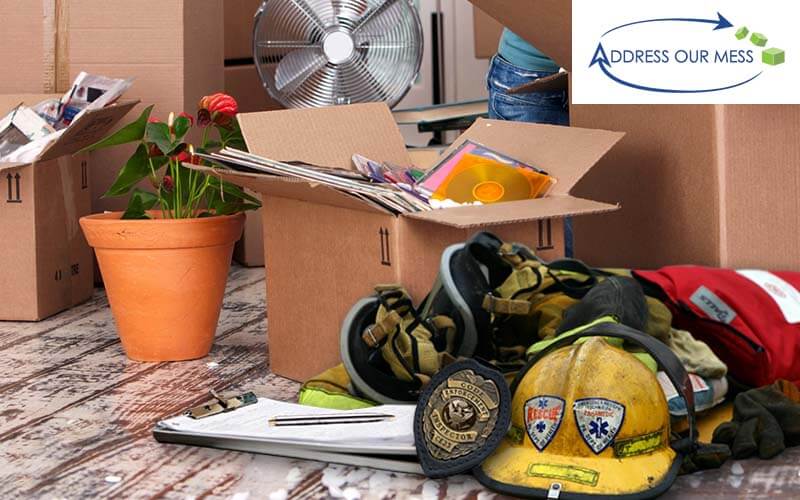Professionals Addressing Concerns of Hoarding

Hoarding can impact various aspects of life, producing various dangers and dilemmas including but not limited to tripping hazards, fire hazards, collapsing, biohazards, financial problems, pest problems, and other looming perils depending on the situation at hand. It is important to be aware of hoarding dangers and understand how to stay safe and prevent potential consequences of hoarding. Different professionals, from firefighters to therapists, have come in contact with various hoarding situations, and they have advice to help you stay safe and address a hoarding situation.
- Advice from Andrew Brown on the Physical Dangers of Hoarding:
Andrew Brown
Philadelphia Hoarding Task Force
EMT for 20 years
Firefighter for 13 yearsHoarding can produce fire hazards from clutter, so it is important to be aware and be prepared. Andrew Brown is actively involved in efforts to bring about hoarding awareness and help. As a firefighter, EMT, and member of a hoarding task force, Andrew fully recognizes the potential fire hazards of hoarding, and has provided a few safety tips that can save lives: “Smoke alarms are the easiest thing that you can do to help save your life in a fire; but they are only effective for about 10 years. Even if you keep replacing the battery, the smoke alarms will still be no good. Replace your alarms with 10 year battery alarms and put one on every level and in every sleeping area…” Clutter can create obstacles that can make it difficult if not impossible to escape in a timely manner during an emergency. “Clear pathways are essential in an emergency. The International Fire Code calls for at least at 36" pathway to the exits in your home. In an emergency, in the dark, with adrenaline and confusion, those 36" are essential. Possessions on the stairs, small pathways, and items that keep your doors from opening fully could mean the difference between escaping or being trapped…”Items on floors can be dangerous tripping hazards to the residents and anyone else who enters the house. “Slip and fall injuries are some of the most common injuries in the home. If you have an accident, a fire, or some other medical emergency, your possessions could keep responders from getting to you. When they do get to you they will then have to get you out. Please remember that they have not been in your home before and will not know the easiest ways in and out, or the best ways to get around or over your things. People may fall and people and things may get hurt.” Make sure floors and stairways are cleared of obstacles in order to prevent possible falls.
- Advice from Jane Bodine on When and How to Start Addressing Hoarding:
Jane Bodine, LCPC
Therapist in private practice for 30 years
Specialty is OCD, BFRB, Panic, Educational Advocacy and ClutterAs a therapist who treats patients as young as four years old, Jane reveals that “Starting earlier means less accumulation. [Individuals with hoarding behavior] are more likely to grasp the concept of too much stuff [when they address the situation at an earlier stage.]” Sometimes the hoarder may not be able to address the situation alone, but the help of family and friends can make a difference. “While hoarders may not be able or willing to change initially, family members can become educated and informed about the disorder.” Having an understanding of hoarding behavior is a good foundation to begin the process addressing the hoarding. - Advice from Angel Gray on Helping a Hoarder:
Angel Gray
Code Enforcement Officer at City of Albany Dougherty CountyAs a Code Enforcement Officer, Angel has had various encounters with hoarding situations. She advises that when attempting to help a hoarder with a hoarding situation, “Never show disregard to their value in what they are hoarding.” Though items may seem of little to no value to outside eyes, to the individual who is hoarding the items, they are treasures that should not be treated with disdain.
These professionals have encountered many different hoarding situations and have an understanding of the various aspects involved. These individuals seek to help those with hoarding behavior and their loved ones, and so does Address Our Mess. If you or a loved one has a hoarding situation, the above advice can help give you an idea where to begin. It is time to address hoarding conditions before problems arise.
Hoarding is a sensitive yet serious matter, so it is crucial to understand hoarding behavior and be aware of how to approach the situation. No one has to be alone in their efforts to address hoarding; help is available. While beginning the journey to a clutter free life, consider the assistance of a therapist who specializes in hoarding in order to address the behavior. Combining psychological and physical assistance will result in the most effective treatment of hoarding. Address Our Mess can help restore property conditions with specialized hoarding cleanup services. For the safety and well-being of the residents, relatives, and the community, addressing a hoarding situation can save the property and lives.